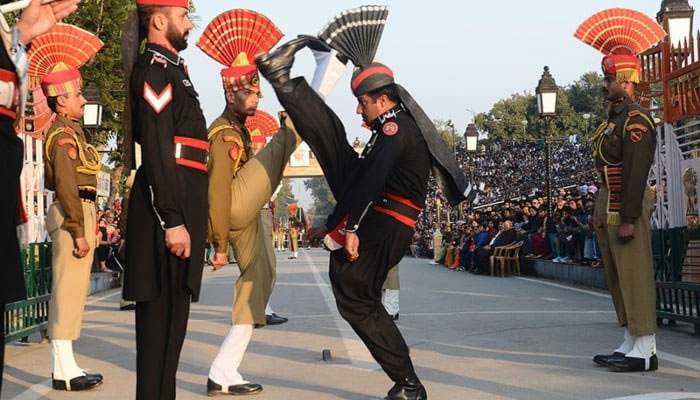Pakistan: the new ‘pookie’ on the block?
Not only that, May 9 events in 2023 created deep divides between decent majority of people and state’s institutions
Had India asked any soothsayer whether it was a good time to attack Pakistan, they would have said that it was not; in fact, it was the perfect time for an attack. Over the past couple of years, especially since the ouster of former prime minister Imran Khan, Pakistan has faced numerous political challenges, with people’s trust in the government sliding sharply. Not only that, the May 9 events in 2023 created deep divides between a decent majority of people and the state’s institutions. Given this context, any attack could have been perfect to hit the already fractured country, create unrest and chaos, and lead it towards anarchy.
But all plans fell apart when the people of Pakistan pulled off a miracle – and this does not relate only to the win on the battlefield. The leadup to the day of India’s missile attack was the manifestation of the iconic ‘Is parcham k saye tale hum aik hain’ [we stand united under our flag]. It was this indescribable patriotism that shielded the people from the war threat. India’s first announcement of a potential attack was largely met by loads and loads of memes. Had that psychological warfare worked, maybe the angry neighbour would have retreated. But the ‘bring it on’ attitude seemingly did more to irk warmongers on the other side of the border.
Then came the attack – something that should have ideally shown our place in the grand scheme of things. Who would have thought that our pilots would be responsible for the first-ever downing of the prestigious Rafale jet? This was followed by an unforgettable press conference by the armed forces, who made it clear that while Pakistan is still in its ‘Unbothered. Moisturised. Happy. In my lane. Focused. Flourishing’ mode, it would retaliate if threatened. This was a measured response, laced with the desire for de-escalation. But India went ahead. Its attack on our military assets (which was followed by night-long propaganda where Indian mainstream channels ran false news and indicated the takeover of Pakistan by the Indian Army) left no room for leniency, leading us to a May we can never forget.
The war (thankfully, short-lived) highlighted two things. First, the ongoing aggression in the Middle East has allowed most people to mistakenly think that war crimes are now allowed. Second, some Pakistanis still tend to equate calls for defence with warmongering. Let’s start from the bottom. Right after India’s missile attack that claimed the lives of civilians, including children, several analysts tried to minimise war hysteria by lecturing Pakistanis. The calls for de-escalation were right and from a good place, but what most people missed is that when one side is aiming missiles at you, not retaliating is not de-escalation, it is surrender. It is unfair on the other side, in this case Pakistan, to ask them to keep bracing the rain of missiles and drones because any retaliation would make peace a distant possibility. In reality, Pakistan’s response led to de-escalation.
Also, the possibility of peace rises when the other side sees the defender as its equal (at least militarily, if not economically). Policing at a time when emotions were already running high was in bad taste. In a report published in Indian media, a WhatsApp group of women journalists from South Asia became a virtual battleground when an Indian journalist objected to the use of a religious phrase and called it a war cry. Today’s India wants to police our words, but we should keep surrendering because we want peace? Pakistanis are not allowed to say ‘Pakistan Zindabad’ (Long Live Pakistan) because this would make us hungry for war and bloodshed? And why should we not ask our defenders to defend us against a mighty force?
Peace with India is a task everyone will gladly take up. The BJP-led government may have made Indians turn against Muslims and, by extension, Pakistan, but India has its own beauty. After all, we are part of the same cloth. During Covid-19, a CNN report that highlighted the awful situation there was run on our channels in a show of solidarity. We mourned the loss of Indian celebrities, journalists, social media creators and their families. There is no denying that we have shared challenges. Those who have met Indians, professionally and personally, have always acknowledged that the two countries should maintain friendlier terms. Two nuclear-armed nations must look for peace. No one likes war. However, our will to defend is often used to paint us as a bogeyman – not by outsiders, but sometimes by our very own.
Peace with India would also require Indian Prime Minister Narendra Modi to fix the wrong his administration has done. Kashmir is a disputed territory, and India in 2019 tried to annex it unilaterally. The valley was without the internet for months. Things started to change a little. Pro-Kashmir activists suddenly toeing the Indian government’s line. Everyone forgot about the injustice done to Kashmiris. The issue may have disappeared from the mainstream media, but it is still there. Most digital outlets that dared to question the Indian PM were intimidated into shutting down. Many political analysts point out Modi’s habit of presenting an alternative reality to outsiders, but the Indian government has focused on short-term gains.
It is easy to pin the blame for its failure on Pakistan. Right after the Pahalgam attack, India announced that Pakistan would be taught a lesson. And this is where the first point discussed above enters. Social media accounts from India started announcing that there should be an ‘All Eyes on Karachi’ situation – a dig at the monstrous conditions in Rafah. This is what war enthusiasts from the other side wanted to see in Pakistan. The night when Indian TVs announced false attacks on Pakistan was also focused on the complete destruction of Karachi. It gave the impression that their hysterical media and apparently Modi supporters wanted to see the death and destruction they saw in the occupied territory in MENA.
The only reason why we cannot become Rafah (prayers that the tiny besieged territory gains its independence too) is that we are a sovereign state, not an occupied territory. We have a strong military infrastructure, and regardless of our internal issues, we are prepared for war. Again, what is happening in the Middle East is a war crime. India will not have the impunity America’s best friend has. The images of dismembered bodies of Pakistanis may be a wet dream for those who wish us harm. But it is still wishful thinking – and this is a compliment to India because it is still not genocidal at least for now.
As we move forward, we hope that the two countries will prefer dialogue over weaponry. However, it must be acknowledged that the people of Pakistan are confident that even if India decides to attack, again or ever, we are well prepared. It is not wrong to assume that an institution that has absolute ‘banger’ (patriotic songs for those who are away from meme lingo) in store to fuel people’s post-war, post-victory hysteria will have all the things necessary ready for its frontline defence.
The writer heads the Business Desk at The News. She tweets/posts @manie_sid and can be reached at: aimen_erum@hotmail.com
-
 Charli XCX Reveals ‘confusing’ Toll ‘Brat’ Popularity Took On Her
Charli XCX Reveals ‘confusing’ Toll ‘Brat’ Popularity Took On Her -
 Android Phones At Risk: PromptSpy Malware Exploits AI
Android Phones At Risk: PromptSpy Malware Exploits AI -
 Barry Manilow Gives Insight Into 'very Depressing' Doctor Visit As He Postpones 2026 Arena Tour Due To Cancer
Barry Manilow Gives Insight Into 'very Depressing' Doctor Visit As He Postpones 2026 Arena Tour Due To Cancer -
 Margot Robbie Opens Up About Imposter Syndrome ‘crisis’
Margot Robbie Opens Up About Imposter Syndrome ‘crisis’ -
 'Desperate' Sarah Ferguson Won't Go Down Without A Fight
'Desperate' Sarah Ferguson Won't Go Down Without A Fight -
 Prince William, Kate Face Major Challenge To Repair Monarchy Reputation After Andrew Arrest
Prince William, Kate Face Major Challenge To Repair Monarchy Reputation After Andrew Arrest -
 Hidden ‘dark Galaxy' Traced By Ancient Star Clusters Could Rewrite The Cosmic Galaxy Count
Hidden ‘dark Galaxy' Traced By Ancient Star Clusters Could Rewrite The Cosmic Galaxy Count -
 Eric Dane 'really Wanted To Talk About His Daughters' In His Final Netflix Interview Before Death
Eric Dane 'really Wanted To Talk About His Daughters' In His Final Netflix Interview Before Death -
 AI Superintelligence Race: Meta And Microsoft Back Rival Visions—Who Will Win?
AI Superintelligence Race: Meta And Microsoft Back Rival Visions—Who Will Win? -
 Chatbots Push Users Into ‘delusional Spirals,’ Experts Warn
Chatbots Push Users Into ‘delusional Spirals,’ Experts Warn -
 Economist Slams AI Doom Predictions, ‘replacing Humans Is Not Innovation’
Economist Slams AI Doom Predictions, ‘replacing Humans Is Not Innovation’ -
 KATSEYE's Manon Bannerman Takes Break From Group For Personal Reasons
KATSEYE's Manon Bannerman Takes Break From Group For Personal Reasons -
 Prince Harry's Reaction On 'disgraced' Uncle Andrew Arrest Revealed
Prince Harry's Reaction On 'disgraced' Uncle Andrew Arrest Revealed -
 Eric Dane’s Friends Initiate GoFundMe To 'support' His Two Daughters After His Death At 53
Eric Dane’s Friends Initiate GoFundMe To 'support' His Two Daughters After His Death At 53 -
 Internet Erupts After Candace Owens Claims Elon Musk And Sam Altman Are ‘not Human’
Internet Erupts After Candace Owens Claims Elon Musk And Sam Altman Are ‘not Human’ -
 Will Princess Beatrice, Eugenie Stay In Contact With Andrew? Source Speaks Out
Will Princess Beatrice, Eugenie Stay In Contact With Andrew? Source Speaks Out




